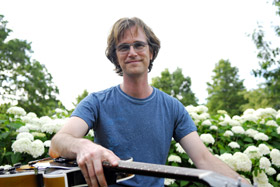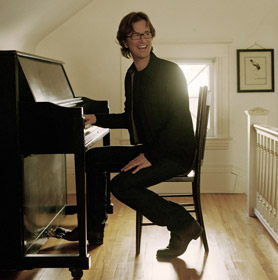Welcome to the second half of this two-part interview with musician Dan Wilson. If you haven’t already read Part One, be sure to check it out to hear about the summer day Wilson wrote his first song, the key role titles play in his songwriting process, and why art is a volume business.
I’d heard Semisonic’s song “DND” several times before learning that “DND” referred to the “Do Not Disturb” signs in hotels. I wondered what your thoughts were on how much you want to let your listeners in on the particulars behind your lyrics?
This is an important question. I’m torn about it. On the one hand, I’m a talkative guy who has a lot of ideas and they naturally come out in my lyrics. So I often am tempted to explain my songs, or at least tempted to lay out for interviewers (and through them, listeners) the thoughts or ideas or stories behind my songs.
But on the other hand, I have a vivid memory of being a kid and reading an interview with Paul McCartney wherein he said that his song “Jet” was about a dog. Not only that one, but “Martha My Dear,” that one was about a dog, too. These were two songs of his that I loved, and I was just deflated by the revelation — I had had my own mental images of the people in both those songs, not that they were visually detailed, but a kind of “songish” vision of the people and the stories. And to learn that these people were dogs was such a letdown.
Now, Sir Paul has every right to write songs about his dogs, I’ve got no problem with that. But in learning that those particular songs were about dogs, I was suddenly deprived of my own pleasant illusion that they were about people. And somehow they shrank in my mind as a result of being explained.
Another factor in all this is that I often don’t know what the songs are about until long after I’ve written them. This makes it tempting to share the interpretation — since in my mind, my explanation is as good as a listener’s. But on the other hand, once I’ve given my interpretation of my own song, it has the quality of being “the last word.” And sometimes, the fans come up with the coolest interpretations of their meanings – way cooler than the interpretation or intention I might have had.
So I try to curb my impulse to explain my songs, lest I shrink them in the ears of fans.
Is there any aspect of the creative process that still intimidates you?
It’s the writing. That’s the most intimidating part. Every time I finish a song, I get the feeling that it’s the last one I’ll ever write. It’s like suffering from a creative hangover. One of the things I’ve had to keep learning is the art of starting over. I’ve had to tell myself, “There will always be another song.” Which is hard to believe during that post-writing hangover.
In the actual writing process, the most challenging part is the lyrics. It’s as though the lyrics are the hard and laborious process that allows me to have the fun of working on the melodies. My guess is that lyrics are the hardest part for most songwriters. In the world of unfinished songs, I bet there are ten wordless tunes for every tuneless lyric. They’re just hard to get right. Bad lyrics distract so much from the melody. I keep trying to tell myself that the only requirement of lyrics is that they not be bad — “First, do no harm.” But I can’t help it, for whatever reason I have to keep working on them until I believe they’re great. And getting to that point is challenging.

